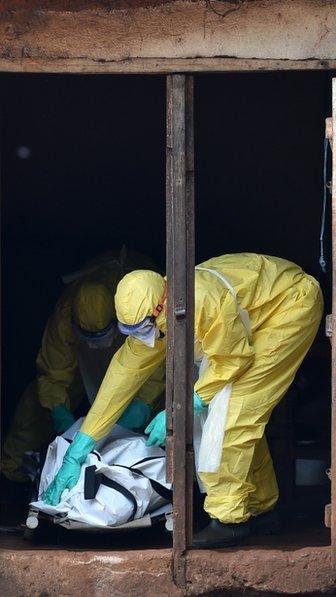Ebola shuts down signs of normal life in Sierra Leone
- Published

So, the number of people who have known to have died of Ebola in the current outbreak in west Africa has passed 5,000. But what does that mean for the affected communities?
I briefly visited Sierra Leone, one of the three most affected countries along with Liberia and Guinea, this week.
One perhaps mundane but nevertheless very difficult thing for a first time visitor to the Ebola zone is not shaking hands with people.
I know Sierra Leone quite well, and I came across at least half a dozen old friends.
Ebola is spread by bodily contact, so, although I had absolutely no reason to suspect my friends were infected, I didn't shake hands.
I kept my distance and performed an awkward sort of hand-on-heart bowing gesture.
They smiled back warmly, as Sierra Leoneans invariably do, Ebola or no Ebola. And we chatted - at a distance.
I flew by helicopter over one of the worst affected areas, the district of Port Loko just north of the coastal capital Freetown.
Other journalists who have been in this district, but on the ground, have reported finding abandoned villages with dead or dying Ebola patients in them, the healthy having fled in fear or in search of food.
So I looked carefully out of the helicopter window.
Few signs of normal life
Even from this height it is usually possible to see signs of normal life.
Typical ones are smoke from cooking fires and colourful daily laundry draped over bushes to dry.
But in a large number of villages there were no signs of life.
Back down on the ground, near Port Loko, I crossed the main road that runs from the capital, north towards the neighbouring state of Guinea.
Normally this is a bustling highway, but Ebola checkpoints and roadblocks have limited trade in the region: there were very few vehicles on the road.
It is clear that Sierra Leoneans are not yet winning the war they have mounted against Ebola.
It's a mixed picture across west Africa.
Late this week the President of Liberia announced she was lifting the state of emergency in her country because of a drop in Ebola cases there.
That's potentially good news, of course. But I've just received a message from the headmaster of a school in the Liberian capital Monrovia.
The immediate area around his school hasn't been hit by Ebola, but with businesses and government offices closed to try to contain the spread, many people haven't been able to work.
As the headmaster put it "no job no money" and parents in his area have found it impossible to feed their children properly.
"Our teachers are all healthy", he said, in that understated way of Liberians who have had more than their share of war and disasters over the years.
"Except they are in dying need of food."